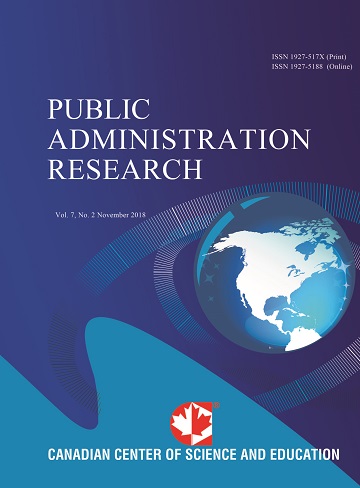Ethnicity and Ethnic Politics: An Impediment to Political Development in Nigeria
- Adeleke Adegbami
- Charles I. N. Uche
Abstract
Nigeria with over 300 ethnic groups, over 1000 dialects, who practiced several religions, with different cultures and histories came under the British imperialist in the 19th century. With the 1st January, 1914 amalgamation of Southern and Northern Protectorate the foundation of a nation now called Nigeria was laid. Nigeria is now populated by over 166 million people, adopted federal system of government with 36 States and a Federal Capital Territory. Despite these component States, Nigeria could still be seen peripherally as a nation with tripodal ethnic structure with the trio of Yoruba, Hausa/Fulani and Igbo constituting a pole each in the unceasing struggle for political and economic resources of the nation. The existing cleavages and hegemonic nature of the Yoruba, Hausa/Fulani and Igbo (major ethnic groups) metamorphosed into a ‘monster-seed’ germinated into hydra headed monster tormenting and straining the nation’s political developments. Apart from inter-ethnic conflicts, there are also intra-ethnic conflicts among these major ethnic groups and other allied minority ethnic groups resulting from unending political manipulation, manoeuvrings, calculations and permutation. The study revealed that, the alliances and coalitions between/among political parties to have overall majority needed to win election(s) are based on ethnic sentiments and ethnic gang-up. The study further revealed the attendant effects of ethnic politics to include- emergence of incompetent political leaders who are not committed to the development of the nation; inability to choose leaders with national outlook or national acceptability; disconnected leaders (self-centred/self-seeking leaders); mediocre in governance; and corrupt leaders being supported by ethnic groups. The sentiment attached to the issues of corruption among political leaders has snowballed to a situation whereby corruption has permeated all levels of government in Nigeria, keeping down about 90 million Nigerians in perpetual poverty. It has equally cost Nigerians whooping sum of over £20 Billion Pounds (about $500 Billion) stolen since independence by past leaders of the country and still counting. Money which could have been used to develop Nigeria has vanished to the pocket of the so called ethnic political leaders with their various towns and villages remaining undeveloped. The study recommended that, Nigerian should imbibe the spirit of oneness and stamp out ethnicity in the conduct of affairs of the nation, in order to experience national unity and peace which are essential ingredients for nation’s development, progress, stability and national integration.- Full Text:
 PDF
PDF
- DOI:10.5539/par.v4n1p59
Journal Metrics
h-index (2017): 7
i10-index (2017): 6
h5-index (2017): 7
h5-median (2017): 13
Index
- CNKI Scholar
- COPAC
- CrossRef
- DTU Library
- EBSCOhost
- EuroPub Database
- Excellence in Research for Australia (ERA)
- Genamics JournalSeek
- Ghent University Library
- Google Scholar
- Harvard Library
- Infotrieve
- Jisc Library Hub Discover
- LOCKSS
- Mir@bel
- Norwegian Centre for Research Data (NSD)
- Open J-Gate
- PKP Open Archives Harvester
- Publons
- ROAD
- Scilit
- SHERPA/RoMEO
- Stanford Libraries
- Ulrich's
- UniCat
- Universe Digital Library
- UoS Library
- WorldCat
Contact
- Gabriel TaiEditorial Assistant
- par@ccsenet.org
